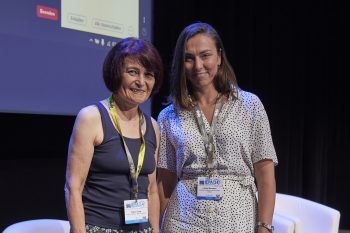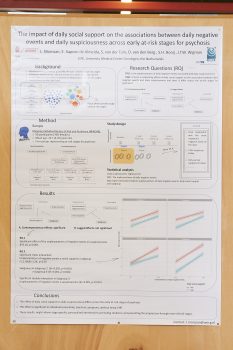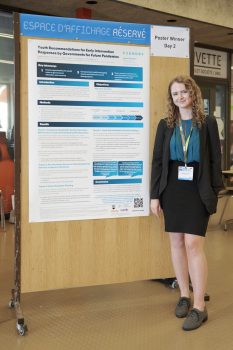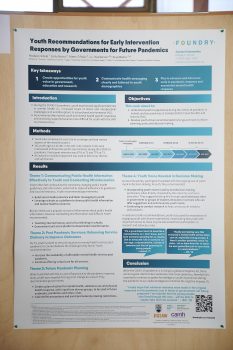October 12, 2023
Posted by:
IEPA
Day 1 Poster Award
Poster Title:
The impact of daily social support on the associations between daily negative events and daily paranoia across different at-risk stages of psychosis
Presenting Author and Poster Award Recipient: Larisa Morosan, University Medical Center Groningen, Netherlands
Abstract:
Psychotic disorders manifest on a continuum of severity, developing from mild to more severe manifestations. There has been an increased focus on the risk factors associated with psychotic experiences, but little is known about the protective factors and how they manifest across the psychosis continuum. We aim to address two research questions: (i) Is the unpleasantness of daily negative events associated with daily paranoia? (ii) Does the effect of daily social support on the association between daily negative events and daily paranoia differ across the at-risk subgroups for psychosis? Data from the Mapping Individual Routes of Risk and Resilience study were used (N=96,76% females, aged 18–35 years old). Participants were assigned intofour subgroups representing different risk stages for psychosis (fromlow risk group to ultra-high risk-UHR). Participants reported each day,for 90 consecutive days, the level of unpleasantness of the daily nega-tive events, the perceived social support and the level of suspicious-ness experienced. The results indicate that: (i) on days when participants reported more unpleasant negative events than usual they also reported higher paranoia than on average and (ii) on days when the social support was perceived higher than usual, the association between the unpleasantness of negative events and daily paranoia was weaker than during the days when the social support was lower than usually, but only in the group of participants presenting prodromal symptoms without being UHR. These results might improve the theoretical understanding of the psychosis continuum and help the development of stage-specific interventions.


Day 2 Poster Award
Poster Title:
Youth Recommendations for Early Intervention Responses by Governments for Future Pandemics
Presenting Author and Poster Award Recipient: Madelyn Whyte
Authors: Whyte, Madelyn (Foundry, 1105-900 Carnarvon Street, V3M 0K4 NewWestminster, Canada); Nichol, Emily (University of Victoria); O’Reilly,Aileen (Jigsaw: The National Centre for Youth Mental Health);Henderson, Joanna (CAMH); Barbic, Skye (University of British Columbia)
Abstract:
Aims: During the pandemic, youth were particularly vulnerable toexperiencing financial hardship, education and employment disrup-tion, and mental health impacts. Ensuring governments and servicesare prepared to support youth during future outbreaks or novel pan-demics should be a key priority. This work aimed to explore youth experiences during COVID-19 and gather youth opinions on government responses to inform planning, policy, and decision-making for future pandemics. Methods: Youth (ages 15–25) from Ireland and two provinces in Canada (British Columbia and Ontario) were interviewed at three timepoints during the COVID-19 pandemic. A thematic analysis was conducted using an inductive approach. This research was primarily youth-led and developed. Results: Across all three time points, youth experienced mental health and service uptake challenges, with mixed views on pandemic response. Opportunities for personal and societal growth were identified, with desire for incorporating youth voices into governmental decision making processes. Youth offered recommendations for effectively communicating accurate information, prevention of misinformation, and expressed needs regarding service accessibility throughout the pandemic and beyond. Conclusion: This work provides insights into the opinions of young people on government and information sharing during the progression of the COVID-19 pandemic. Recommendations were developed to ensure youth are consulted and represented in future pandemics.


Day 3 Poster Award
Poster Title:
Taking the turn of loved ones expressed needs in group psychological education programming at a First Episode Psychosis (FEP) clinic
Presenting Author and Poster Award Recipient: Genevieve Gagne
Authors:
Gagne, Genevieve (CHUM–Clinique JAP, Montréal, Canada); Gagnon, Mélanie (CHUM-Clinique JAP); Bonneau,Line (Lady Davis Institute for Medical Research Jewish General Hospital);Levasseur, Mary Anne (UQAR–équipe de la Chaire CIRUSSS); Abdel-Baki,Amal (CHUM–Clinique JAP)
Abstract:
Aims: Most early intervention for psychosis guidelines mainly recommend that family interventions focus on family psychoeducation. Engaging families is important to optimize patient engagement and prevent relapses. However, it remains a challenge and little is known about families’ satisfaction around the fulfilment of their needs. Methods: Pre-post questionnaires were developed with family peer support workers and family partners. We collected a total of 64 ques-tionnaires from participants in our 2018–2020 family psychoeduca-tion groups. We identified a series of needs unmet by the currentprogram, and leads on how to makes changes. Focus groups were held with clinicians, family members, community workers and peer support workers to get their feedback on the changes considered. Results: The main themes revolved around the caregiver role including communication with the youth, sharing lived experience with peers and clinicians, and hearing patient recovery stories. We refocused our material exclusively on families’ practical needs: adapting communication and support in regard to acute and cognitive symptoms, sub-stance abuse, return to work or school, etc. Emphasis was also placedon providing strategies for caregiver’s self-care. Additionally, we added a family support group, led by family peer support workers in collaboration with a community organization, and asynchronous webinars on our web site. Conclusions: A new family program was co-constructed with and forfamilies, taking into account the diversity of experiences, includingthose of cultural minority groups, whilst respecting the rhythm ofacceptation and grief to instill hope and foster patient recovery.